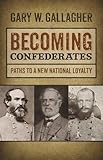Becoming Confederates : Paths to a New National Loyalty.
Material type: TextSeries: Mercer University Lamar Memorial LecturesPublisher: Athens : University of Georgia Press, 2013Copyright date: ©2013Description: 1 online resource (111 pages)Content type: text Media type: computer Carrier type: online resourceISBN: 9780820344973Subject(s): Change of allegiance -- United States -- Case studies | Early, Jubal Anderson, -- 1816-1894 | Lee, Robert E. -- (Robert Edward), -- 1807-1870 | Patriotism -- Confederate States of America -- Case studies | Ramseur, Stephen Dodson, -- 1837-1864 | United States -- History -- Civil War, 1861-1865 -- Causes | United States -- History -- Civil War, 1861-1865 -- Social aspectsGenre/Form: Electronic books.Additional physical formats: Print version:: Becoming Confederates : Paths to a New National LoyaltyDDC classification: 973.7/13 LOC classification: E468.9 -- .G34 2013ebOnline resources: Click to View
TextSeries: Mercer University Lamar Memorial LecturesPublisher: Athens : University of Georgia Press, 2013Copyright date: ©2013Description: 1 online resource (111 pages)Content type: text Media type: computer Carrier type: online resourceISBN: 9780820344973Subject(s): Change of allegiance -- United States -- Case studies | Early, Jubal Anderson, -- 1816-1894 | Lee, Robert E. -- (Robert Edward), -- 1807-1870 | Patriotism -- Confederate States of America -- Case studies | Ramseur, Stephen Dodson, -- 1837-1864 | United States -- History -- Civil War, 1861-1865 -- Causes | United States -- History -- Civil War, 1861-1865 -- Social aspectsGenre/Form: Electronic books.Additional physical formats: Print version:: Becoming Confederates : Paths to a New National LoyaltyDDC classification: 973.7/13 LOC classification: E468.9 -- .G34 2013ebOnline resources: Click to View Cover Page -- Title Page -- Copyright Page -- Dedication -- Contents -- Acknowledgments -- Introduction -- Chapter One: Conduct Must Conform to the New Order of Things -- Chapter Two: He Died as Became a Confederate Soldier -- Chapter Three: Consistent Conservative -- Chapter Four: For His Country and His Duty -- Notes -- Index.
In Becoming Confederates , Gary W. Gallagher explores loyalty in the era of the Civil War, focusing on Robert E. Lee, Stephen Dodson Ramseur, and Jubal A. Early-three prominent officers in the Army of Northern Virginia who became ardent Confederate nationalists. Loyalty was tested and proved in many ways leading up to and during the war. Looking at levels of allegiance to their native state, to the slaveholding South, to the United States, and to the Confederacy, Gallagher shows how these men represent responses to the mid-nineteenthcentury crisis. Lee traditionally has been presented as a reluctant convert to the Confederacy whose most powerful identification was with his home state of Virginia-an interpretation at odds with his far more complex range of loyalties. Ramseur, the youngest of the three, eagerly embraced a Confederate identity, highlighting generational differences in the equation of loyalty. Early combined elements of Lee's and Ramseur's reactions-a Unionist who grudgingly accepted Virginia's departure from the United States but later came to personify defiant Confederate nationalism. The paths of these men toward Confederate loyalty help delineate important contours of American history. Gallagher shows that Americans juggled multiple, often conflicting, loyalties and that white southern identity was preoccupied with racial control transcending politics and class. Indeed, understanding these men's perspectives makes it difficult to argue that the Confederacy should not be deemed a nation. Perhaps most important, their experiences help us understand why Confederates waged a prodigiously bloody war and the manner in which they dealt with defeat.
Description based on publisher supplied metadata and other sources.
Electronic reproduction. Ann Arbor, Michigan : ProQuest Ebook Central, 2018. Available via World Wide Web. Access may be limited to ProQuest Ebook Central affiliated libraries.

There are no comments on this title.